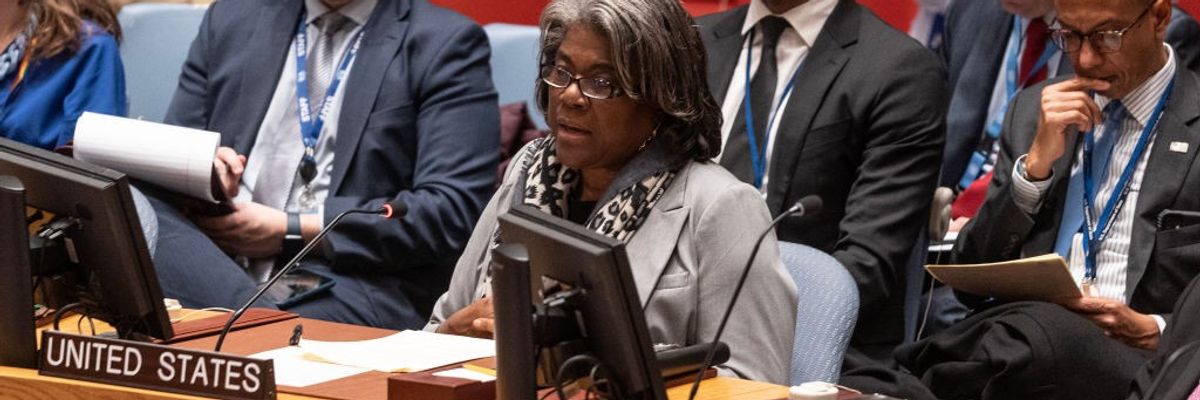The United States on Wednesday vetoed a United Nations Security Council resolution that condemned violence against civilians in Israel and Gaza and called for "humanitarian pauses" to allow aid to enter the besieged Palestinian territory.
Twelve of 15 members of the U.N. Security Council supported the Brazil-sponsored resolution, including France, Japan, Switzerland, China, and the United Arab Emirates. The United Kingdom and Russia abstained, and the U.S. was the lone no vote.
Because the U.S. is one of the body's five permanent members, its no vote was enough to tank the resolution, which also denounced Hamas' attack on Israel and urged "all parties to fully comply with their obligations under international law."
Human Rights Watch (HRW) voiced outrage over the vote, saying in a statement that "once again the U.S. cynically used their veto to prevent the U.N. Security Council from acting on Israel and Palestine at a time of unprecedented carnage."
"In so doing, they blocked the very demands they so often insist upon in other contexts: all parties to comply with international humanitarian law and ensure that vital humanitarian aid and essential services reach people in need," said HRW. "In light of the council's deadlock, U.N. member countries should ask the General Assembly to take urgent action to protect civilians and prevent large-scale atrocities."
The U.S. veto came a day after the Security Council rejected a Russian resolution that called for a humanitarian cease-fire in Gaza. On Wednesday, Russia tried to add explicit cease-fire language to the Brazilian-led text and decided to abstain after its efforts failed.
In explaining Wednesday's lone no vote, U.S. Ambassador to the United Nations Linda Thomas-Greenfield said that "the United States is disappointed this resolution made no mention of Israel's right of self-defense."
"Though we could not support this resolution, going forward we will continue to work closely with all council members on this pressing issue," she added.
Sérgio França Danese, Brazil's ambassador to the U.N., expressed disappointment in the Security Council's failure to unify around the call for humanitarian pauses and adherence to international law.
"Council paralysis in the face of a humanitarian catastrophe is not in the interest of the international community," said Danese. "Very sadly, the council was yet again unable to adopt a resolution on the crisis, again silence and inaction prevailed."
"Stocks of food, hygiene material, and medicine are rapidly dwindling."
Israeli airstrikes have killed more than 3,400 people—including over 1,000 children—in Gaza in less than two weeks, and a total blockade on the occupied enclave has amplified suffering and pushed the territory's healthcare system to the brink of collapse.
"People are forced to drink water that is not suitable for consumption, as clean potable water is simply not available," Philippe Lazzarini, secretary-general of the United Nations Relief and Works Agency for Palestine Refugees in the Near East, said Wednesday. "Stocks of food, hygiene material, and medicine are rapidly dwindling."
After nearly two weeks of an illegal siege, Israeli Prime Minister Benjamin Netanyahu's office pledged Wednesday that Israel will not block aid—specifically food, water, and medicine—from entering Gaza through Egypt as the territory's humanitarian catastrophe deepens.
The Associated Press noted that "the statement from Netanyahu's office made no mention of badly needed fuel and it was not clear when the aid will start flowing."
Marwan Jilani, director general of the Palestine Red Crescent Society, told Al Jazeera on Wednesday that "nobody knows" whether aid that has been stuck at Egypt's border for days will actually reach Gaza.
"We are getting ready so that whenever this border crossing opens, we will be using this opportunity to get critical relief for the people inside Gaza, especially for the patients, the hospitals, and the people at-large," said Jilani.




